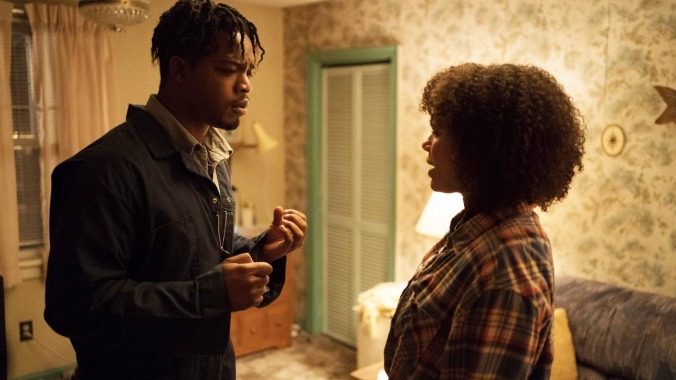Delia's Gone takes a lackluster approach to a murder mystery
Marisa Tomei doesn't get much help in a film that doesn't deliver as a straight crime thriller or as a meditation on mental health

In 1994, Johnny Cash’s black and white music video for “Delia’s Gone” debuted on MTV, introducing a generation of alterna-kids to classic-style country that was cool in an era of Garth Brooks’ pop version. It was a game changer for the musical tastes of millions, culminating in Cash performing a rendition of Nine Inch Nails’ “Hurt” that arguably became better known than the original. Though one might hope that Delia’s Gone, the new movie of the same name has something similarly novel to offer, sadly it’s just another minor variation on the “sympathetic fugitive pursued by bickering lawmen” formula that Hell Or High Water briefly reinvigorated.
To be fair, neither the movie nor Cash’s version of the song has much to do with the original story that inspired both: in Savannah, Georgia, in 1900, 14-year-old Delia Green got shot by her boyfriend at a Christmas party. He served 12 years and died in 1927, but not before the incident inspired two murder ballads, “Delia’s Gone” and “Delia,” that have been covered repeatedly ever since. The movie, at least, cast a black actress as Delia, faithful to the true story (Cash’s video cast Kate Moss). But its versimilitude ends there. The movie doesn’t even pronounce her name “Deel-yuh” like the songs; here, it’s “Dell-ee-uh.” The filmmakers do however play Blind Willie McTell’s original version of “Delia” over the end credits.
Here, Delia (Warehouse 13’s Genelle Williams) is a grown adult, taking care of her intellectually disabled brother Louis (Stephan James) until she loses her job. After the two of them turn to the bottle to forget their shared troubles, he awakens the next morning with bloody knuckles, a trashed apartment, and poor Delia face down on the floor dead. Presuming his own guilt, Louis pleads guilty.
But he isn’t. And seven years later, Louis exits prison for a voluntary care facility, where a stranger comes to visit claiming to have new information about the murder. Despite a series of obstacles, Louis decides to follow up a name he learns—the very movie-worthy moniker Stacker Cole—and find out the truth, even if doing so gets him in even deeper trouble. Meanwhile, he’s pursued by an A-list veteran actor and a younger character actor (a la Morgan Freeman and Cameron Monaghan in Paradise Highway, or Jeff Bridges and Gil Birmingham in Hell Or High Water).
In this case, the A-lister is Marisa Tomei as a sheriff-turned-detective, and Paul Walter Hauser as the replacement in her former role. Their interplay unfolds with such a bizarre mix of tones—from scene to scene, or even shot to shot—that it’s as if writer-director Robert Budreau gave them four different ways to play it, then haphazardly combined the resulting takes.
The script takes pains to note that Louis isn’t technically autistic; he has a brain injury that mimics some of the symptoms of being on the spectrum. This feels like both a cover-your-ass footnote in case any neurodivergent viewers or organizations cry foul on the depiction, and an excuse to lean into certain mental-handicap cliches, like the ability to become One-Punch Man in anger. He also manages to figure out a years-old crime before anyone else, and to instantly start his truck that’s been in the same place for seven years. (Don’t count on that at home, kids.) Nevertheless, and more out of narrative obligation than active reasoning, the cops somehow must remain one step behind him.
James does a decent job with what he’s been given, but it’s never clear exactly what the movie hopes to do with his character. Is this just another crime and punishment retread? Or is it meant to serve as a metaphor for dealing with grief while disabled? It’s too broad to work as the latter, and too unhurried for the former. A story like this is the sort of thing that the Coen brothers would use as a foundation for layers of weirdness. In the absence of filmmakers like the Coens—perhaps the two-headed Johnny Cash of this cinematic translation—director Robert Budreau unfortunately doesn’t even deliver a sturdy, straightforward rendition.